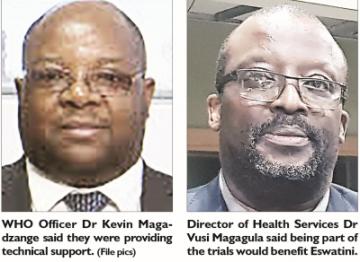ESWATINI TO PARTAKE IN COVID-19 VACCINE TRIALS

MBABANE – Eswatini has joined over 150 countries participating in a COVID-19 vaccine trial under COVAX Facility.
The COVAX Facility is part of COVAX, the vaccines pillar of the Access to COVID-19 Tools (ACT) Accelerator, which is co-led by the Coalition for Epidemic Preparedness Innovations (CEPI), Gavi, the Vaccine Alliance, and the World Health Organisation (WHO), working in partnership with developed and developing country vaccine manufacturers, UNICEF, the World Bank, Civil Society Organisations and others.
This was confirmed by Ministry of Health Principal Secretary Dr Simon Zwane. He was responding to a questionnaire that was sent to him on the country’s participation in international COVID-19 clinical trials and how it would benefit Eswatini. Zwane confirmed that indeed Eswatini has joined one clinical trial through the COVAX arrangement.
He said preparations to enrol participants in the trial are ongoing and the protocol was undergoing finalisation and the Ministry of Health National Research Unit would oversee the trial, with technical assistance from ICAP and the US Centre for Disease Control (CDC). “This is important as it will contribute to building of the country’s capacity in advanced research, and increase research expertise among locals. The country will also contribute in the worldwide body of knowledge on the treatment and control of the coronavirus,” he said.
Giving further details on the trial the country would be participating in; Director of Health Services Dr Vusi Magagula said being participants in the COVAX Facilities would help the country in terms of easy access to the vaccine once it is approved and ready for use.
This is in respect of affordability, among other benefits and he highlighted that the COVAX would fund up to 20 per cent of the vaccine to each member state that participated, which would be a huge benefit for Eswatini. “The countries participating in the trials will be prioritised when the vaccine is approved and ready for use in that they would have easy access and they would also get a certain percentage of the vaccine courtesy of the COVAX Facility,” he said.
According to the Vaccine Alliance website, the allocation of vaccines, once licensed and approved, will be guided by an allocation framework released by WHO following the principle of fair and equitable access, ensuring no participating economy will be left behind.
Policies determining the prioritisation of vaccine rollout within economies will be guided by recommendations from the WHO Strategic Advisory Group of Experts on Immunisation (SAGE), which has recently released a Values Framework laying the groundwork for subsequent guidance on target populations and policies on vaccine use.
Eswatini WHO Health Promotion Officer Dr Kevin Magadzange also confirmed the country’s participation in the COVAX clinical trials and stated that as an organisation, they were providing technical support in terms of vaccines in the pipeline and other relevant information needed by the Ministry of Health on this exercise.
“The good thing about having people from the country participating in the trials is that we would have assurance that the vaccine would work for our population as the vaccine would be tested on them unlike when the vaccine is coming from other foreign entities without any background on its effect on a specific group,” he said.
No details on trialists yet
When quizzed on how many emaSwati would be participating in the trials, Magadzange said the companies overseeing the vaccines spoke directly to governments of each country in terms of the number of people expected to participate and WHO Eswatini didn’t have that information.
In the Vaccine Alliance website, it says that the success of COVAX hinges not only on economies signing up to the COVAX Facility and commitments from vaccine manufacturers, but also filling key funding gaps for both COVAX research and development (R and D) work and the Gavi COVAX advance market commitment (AMC) to support participation of lower income economies in the COVAX Facility.
“As well as procuring doses for participating economies, the COVAX Facility will also maintain a buffer of doses for emergency and humanitarian use.”
Initially, this publication reported that Eswatini was not part of 25 African countries that had registered for clinical trials for possible COVID- 19 treatments.
This was previously confirmed by Director of Health Services Dr Vusi Magagula in response to a declaration by South African President Cyril Ramaphosa, that the aforementioned African countries had registered clinical trials for possible COVID- 19 treatments, including for the BCG vaccine, hydroxychloroquine, antiretroviral and remdesivir.
70 VENTILATORS at health
Another milestone to celebrate in the country’s strive to improve the health system and ensure mass access to health care, amid the COVID-19 pandemic, is the glaring improvement in securing ventilators, which are reportedly 70 from an unconfirmed seven.
According to Healthline.com, a medical ventilator is a machine that helps the lungs work and it is used for breathing problems that can accompany a variety of conditions, including COVID-19.
Health Ministry PS Dr Simon Zwane said there had been a number of equipment donated by various entities towards the management and control of the COVID-19 pandemic in the country. He said the organisations that have donated the equipment include embassies, international donor organisations, local parastatal organisations, local private businesses and philanthropists.
Some of this equipment includes ventilators, cardiac monitors, pulse oximeters, oxygen gauges and concentrators and other equipment for critical care. “The donation of equipment has been largely targeted at improving the management of critical care patients who have been diagnosed with COVID-19. Furthermore, the equipment has enabled decentralisation of COVID-19 management to peripheral health facilities. The donated equipment has also been used to conduct trainings of health workers in critical care management,” Zwane said.




 del.icio.us
del.icio.us Digg
Digg
Comments (0 posted):